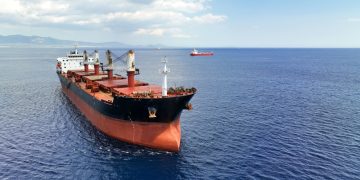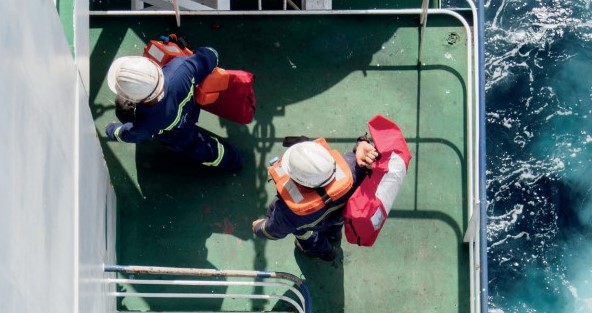On 23 March 2023, the UK’s Seafarers’ Wages Act (the Act) received Royal Assent. This was followed, on 30 March 2023, by the UK Government’s nine-point plan to improve conditions for seafarers, the Act being one of the plan’s nine elements, Hill Dickinson’s experts explain.
In the following article, Colin Lavelle, Helene Peter- Davies and Reema Shour from Hill Dickinson, set out some of the background to the Act and the nine-point plan, summarise the key provisions of the Act and highlight some considerations for ship operators and harbour authorities.
The Act is expected to come into force in June 2024. Before that can happen, the Government must enact regulations dealing with a number of procedural, technical and administrative issues arising out of the Act. An initial consultation process is already underway to deal with certain aspects of the legislation. A second consultation process dealing with other aspects is scheduled to follow. The Government plans to present draft regulations to Parliament in early 2024. In the meantime, it has published a draft Guidance on the regulations, discussed below.
The catalyst for this new legislation was the action, in March 2022, by P & O Ferries (owned by DP World) where almost 800 employees were dismissed without notice or consultation with the unions. The crews were replaced with lower-paid agency workers.
This much-publicised incident highlighted the fact that seafarers working on international routes to or from UK ports were only entitled to the UK national minimum wage (NMW) if they were working or usually worked in the UK. In simple terms, this covered only seafarers who worked or ordinarily worked in UK territorial waters whatever their place of residence or the flag of the vessel on which they worked.
At the same time, UK-resident seafarers who were entitled to the NMW were at risk of being passed over by shipowners and operators who did not want to pay the minimum wage and who could find cheaper labour elsewhere. The Government, therefore, sought to level the playing field by ensuring that seafarers with close ties to the UK are paid at least an amount equivalent to the UK NMW whilst the ships they are onboard are within UK territorial waters. As at November 2023, the NMW is £10.42 for individuals who are 23 years old or older.
The Act
The Act applies to services which carry goods or people by ship between a place outside the UK and a place in the UK. It requires harbour authorities to ask the operator of a service which enters a UK harbour 120 times or more in a year (or is reasonably believed to do so) for a declaration that seafarers on the service who do not qualify for the UK NMW are being paid at least NMW for their work (work in the UK or UK territorial waters).
The Act applies irrespective of the nationality of the seafarer or their place of residence or the flag state of the vessel on which they are employed.
Harbour authorities will be required to impose a surcharge on the operator of a service if the operator does not provide a declaration or if the declaration is provided late or is misleading. If the surcharge is not paid, the harbour authority will be required to refuse access to the service.
The Act also contains criminal sanctions under which both operators and harbour authorities may be liable, the former for failure to comply and the latter for failure to enforce. The Secretary of State may also appoint investigators from the Maritime and Coastguard Agency (MCA) to check that operators are complying with the Act.
The Guidance
In November 2023, the Government published a draft Guidance on the Seafarers’ Wages Regulations. The purpose of the Guidance is to assist affected harbour authorities and operators of services to comply with their duties under the Act and the Seafarers’ Wages Regulations 2024 (‘the Regulations’).
It also sets out the enforcement powers to be used by the MCA and may assist unions and seafarers to understand how the Act and Regulations will apply to the payment of wages.
Among other clarifications in the Guidance:
Service:
The Act applies to a service for the carriage of persons or goods by ship, with or without vehicles, between a place outside the UK and a place in the UK. The Act, therefore, does not apply to domestic service, nor to a service that is for the purpose of leisure or recreation nor to a service provided by a fishing vessel.
The requirement for harbour authorities to request a declaration where a service enters a UK harbour at least 120 times in a relevant year, is based on a total number of calls per service, rather than per ship. Multiple ships can be operating the same service. If an operator has more than one ship operating on the same route, this could constitute a single service, and every call made to the UK harbour by any ship operating that service would count towards the 120 times a year.
What constitutes a service will be a question of fact and degree.
Operator:
The operator is the person (an individual or a company) who has, or has agreed to take over, the duties and responsibilities imposed on shipowners under the Maritime Labour Convention (MLC) in respect of any ship providing the service.
Where a harbour authority is required to communicate with the operator for the purposes of the Act, it is their responsibility to ascertain who the operator is under this definition. If they are uncertain, they should communicate with their customers to determine this. In most cases, the MLC shipowner will be the same as the owner of the ship. In some cases, it could be the manager, agent or charter who has assumed the responsibility for the operation of the ship from the owner.
The Guidance also covers:
- NMW equivalence declarations;
- Penalties;
- Imposition of surcharges;
- Objection to surcharges;
- Refusal of harbour access for failure to pay surcharges (there are only four exceptions to this: force majeure; overriding safety concerns; need to minimise or reduce risk of pollution; and need to rectify deficiencies on ship); and
- Enforcement.
- Compliance
Ship operators calling regularly at UK ports should check whether they meet the threshold under the Act and, if so, should ensure that they understand their obligations under the Act and the forthcoming Regulations. Among other things, it is recommended that they review their crews’ wages, pay NMW or equivalent as required and have the relevant information to hand in order to make a timely declaration to the harbour authorities as and when required.
Otherwise, they may be at risk of fines, prevention of harbour access and also reputational damage. This requirement is in addition to and may be above the requirement for payment of minimum wage under the provisions of the MLC as applicable under the law of the flag state of the vessels being operated.
Harbour authorities should familiarise themselves with their duties and obligations under the Act and Regulations. This includes recommendations that they are clear as to: when they must request a declaration; when a surcharge must be imposed and the amount; how and when they must notify the operator of the surcharge imposed; and when they must refuse service access for failure to pay a surcharge. A failure to impose a surcharge or to refuse access when it should have done is an offence on the part of the harbour authority and can lead to prosecution and a fine.
Both operators and harbour authorities should also ensure that they comply with any request by the Secretary of State to provide information. In the operator’s case, such information might be to establish whether a service is being operated in accordance with an equivalence declaration provided by the operator, whether such a declaration is false or misleading or it may be information regarding the service provided by people working on a ship and their remuneration.
In the case of the harbour authority, such information might be about: services provided by ships that use the harbour; equivalence declarations requested by, or provided to, the harbour authority; surcharges imposed or received; or decisions to refuse or not to refuse access to the harbour.
Neither an operator nor a harbour authority is obliged to provide information if and to the extent that it would cause it to breach domestic data protection legislation. However, a failure to provide the relevant information where there is no reasonable ground to do so can lead to fines and prosecution.
Seafarers’ Charter
In July 2023, the UK Government launched a Seafarers’ Charter, a voluntary agreement with maritime operators that is part of its nine-point plan and that is aimed at good quality seafarer employment. The Charter was launched alongside a similar initiative by the French Government. Generally speaking, the Charter builds on the protections already laid out in the MLC.
More specifically, the Seafarers’ Charter requires employers to:
- pay seafarers for overtime at a rate of a least 1.25 times the basic hourly rate;
- ensure adequate training and development is provided;
- provide employees with a full, indefinite contract;
- allow seafarers to receive social security benefits, including sickness benefits, family benefits, and medical care;
- adopt roster patterns considering fatigue, mental health and safety;
- provide adequate rest periods between shifts and rosters; and
- carry out regular drug and alcohol testing.
Operators who can demonstrate that they comply with the standards set out in the Charter can apply for verified Seafarers’ Charter status.
The UK and France have agreed to continue working together to improve conditions for seafarers working in the English Channel to protect crews from exploitation. The UK Government further plans to create a statutory code of practice to prevent rogue employers from using sharp practices, such as threats of dismissal to pressurise employees into accepting less favourable terms.
Maritime unions have welcomed the Charter but are calling for it to be made mandatory.
The UK Government is committed to promoting and reforming laws and practices relating to seafarers’ welfare. However, all those who are potentially impacted by the new laws and regulations are recommended to familiarise themselves with their rights and obligations under the legislation and to take legal advice as necessary.
Above article has been initially published on Hill Dickinson’s website and is reproduced here with authors’ kind permission.
The views presented hereabove are only those of the author and do not necessarily reflect those of SAFETY4SEA and are for information sharing and discussion purposes only.


































































